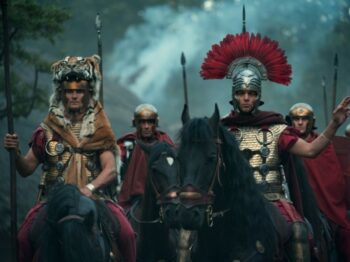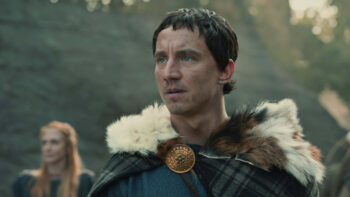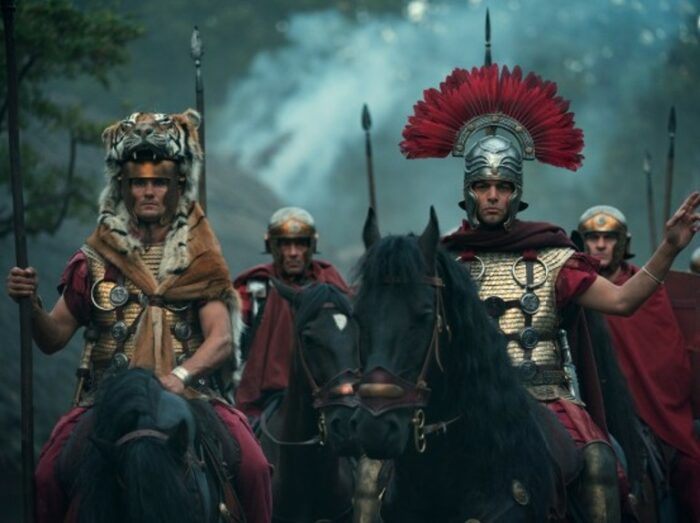History as Fantasy: Netflix’s Barbarians Miniseries
This week’s post is a review of a miniseries on Netflix–Barbarians–what it’s about, how historic it happens to be, what I think is good and bad about it, and the significance of what it portrays beyond its supposed goal of capturing history. Generally, historical fiction is outside the realm of speculative fiction–but I think Barbarians takes history and in effect makes it into a fantasy tale, including even elements of magic.
Some spoilers of the plot of the miniseries will follow, though I will speak in generalities when possible.
Latin and German
Barbarians grabbed my attention from its opening scenes with a storytelling decision that I really enjoyed that may not matter much to most speculative fiction fans: the Romans spoke Latin, not Ecclesiastical or Church Latin, but Latin as linguists believe it was spoken 2000 years ago, with rolling Rs and Vs pronounced like the letter W in English. The series comes in dubbed versions–I’ll say more about that later on–but only the speech of the Barbarians is dubbed. All versions portray the Romans speaking Latin.

Some Latin-speakers riding in. Image copyright: Netflix.
I watched the original version, not a dubbed one, but with dialogue in subtitles (Spanish subtitles in the version I saw, actually). The miniseries was produced in Germany, though largely filmed in forests in Hungary, so the language the Barbarians speak in the original version is German. For a few minutes I had the illusion that even the German was supposed to represent a re-constructed ancient German. I thought so because of certain particular words. What in modern German would be “king” is König, but in Barbarians is Reik, an older term. And the actors pronounce tribe names in a way I think better matches ancient pronunciation than modern. For example, the tribe of the Cherusci is consistently said as “Kheruska.”
But no, the German of the barbarians in Barbarians is in fact, modern German, without even any regional dialect from what my research on this topic turned up. In fact, my college German I studied more than twenty years ago kicked in more and more as I watched the series, to the degree that by episode six I understood most of the dialogue without referring to the subtitles–and my poor wife had to put up with me saying random things in German for a while.
So, other than reviving my German and pleasing my Latin-loving-language-and-history nerd self, what’s good about this series?
The Good and the Bad in Visual Details
One of the good things stems from small historical touches. Not only the use of Latin in correct pronunciation, but the clothing and uniforms and set design is all quite historical and interesting. I will say more about the historicity of the plot or lack thereof in another point, but in most small details, the miniseries gave an accurate view of what ancient times really looked like based on actual archaeology and known fact.
Germanic wooden building with thatched roof and dirt floors, large wooden barns and storerooms, plus glimpses of Rome, all were extremely historically accurate from what I know of the history. Roman uniforms, including some officers wearing breastplates with artistic musculature and metal masks shaped like a human face added to helmets are based on archeological findings. The Romans really did wear stuff like that–not all the uniforms were perfectly uniform. And German clothing–instead of showing them in animal skins or no clothing as per Conan the Barbarian, realistically showed people wearing simple clothing in natural colors, sometimes with simple plaid patters, as if hand-woven, which is certainly what the Germanic tribes would have worn.
Hairstyles I also saw as good at first. Romans are consistently shown as clean-shaven, with a pretty standard hairstyle. Germanic tribesmen and women are showing with a wide variety of hairstyles. Most of the women have long hair, but some have braids and some don’t. Some men have long hair, but some don’t. Some men have beards but others are clean-shaven. And at least one tribal leader is shown as having a shaved head.
I at first thought that was good because ancient Germans really did have the ability to cut and style hair and certainly did so. But…after a while the variety of hairstyles seemed unrealistic to me. Yeah, the technology to shave a head existed, but it wouldn’t be easy and there’s no evidence I know of that ancient Germans actually ever did routinely shave their heads. And I would expect the hairstyles to follow a tribal pattern, but they did not. In fact, overall, hairstyles simply reflected individual barbarians making individual choices, just as modern people would. I don’t think that’s an accident of how the story was told–it was done to make the Germanic tribes seem more like modern people, I think–but it wasn’t strictly historically accurate.
Another thing I was disappointed with was the actual battle scenes in episode 6. I read a film critic reviewer who complained episodes 1-5 dragged on long for him, but episode 6 was great. I in fact was hoping for some meticulous attention to detail showing how Romans fought versus how barbarians engaged in combat, but nope. The Romans mostly did not even try to hold formation at certain key moments, didn’t raise their shields when they would have (spears flying at them), and mostly swung a gladius (Roman short sword) instead of stabbing with it, which was what it was mainly designed to do.
I also found a particular moment of battlefield flames (Germanic warriors setting parts of a field full of Romans on fire) to make no sense, to even qualify as silly–unless we see the portrayal as a fantasy and not historical fiction. In fantasy you can create any number of concoctions that will burn like gasoline or diesel, especially when magic is involved. Historical reality limits you to what the peoples of the time actually would have had. And what did Germanic peoples have that would burn like crazy? Pretty much tree pitch, which would harden if not kept warm, and rendered fat, which also needed to be kept warm not to gell. Both of which have distinctive smells, are not all that easy to come by–oh, and also don’t burn just like gasoline.
So, if you’re expecting historical reality in the battle scenes, sorry, what Barbarians in fact delivers there is mostly fantasy. (On the other hand, if you’re expecting fantasy, maybe you’ll have a good time watching the battles.)
A Sketchy Plot Overview–OR an Overview of a Sketchy Plot
The actual history behind Barbarians centers around the defeat of a Roman army in the Battle of Teutoburg Forest. A coalition of Germanic tribes destroyed three Roman legions under the command of Publius Quinctilius Varus in A.D. 9. The history we have is entirely written from the Roman point of view–no Germanic versions survive, because the Germans were illiterate at this time. However, archeological digs around the German town of Kalkreise show additional information about the battle, beyond just what the Roman historians said.
The key aspects of the battle that the miniseries gets right relate to the Romans under Varus alienating Germanic peoples with wanton cruelty and excessive taxation. Barbarians also agrees with history that the primary person responsible for defeat of Varus was a Germanic tribesman who had been taken to Rome as a captive as a child and who had achieved Roman citizenship and a position of trust as an Equestrian (roughly like being knighted). This barbarian-turned-Roman-who-betrayed-Rome was named Arminius.
The Netflix series goes astray in that portrays Arminius as an adopted son of Varus, which could be true but history does not record it that way. History says Arminius was a commander of auxiliary troops (Germans who fought on the Roman side) and someone Varus saw as a friend. Also, the Roman account of the battle has it lasting for three days, during heavy rain, with a number of specific things happening that are not captured in the Netflix version. And the number of people involved in the battle was much higher than what Barbarians shows. Between 16,000-20,000 on each side in reality in contrast to a few hundred shown and a reference to Arminus having “500 friends” in a snippet of dialogue.

Arminius in Germanic clothing. Image copyright: Netflix.
Whether Arminius will betray his adopted Roman father or not as opposed to betraying his childhood friends and actual father (a Germanic Reik, a tribal king) is what the plot mostly focuses on. It also makes his friends very important to the tale, including a woman (Thusnelda) who winds up leading troops in battle, which history does not record.
I would have instead told the story from the point of view of how the plot was carried out and covered up and how the Germanic tribes in fact beat the Romans. There’s some of that in Barbarians, but the focus really is on Arminius’s decision and it takes him quite some time to make up his mind.
This personal focus winds up with a plot that’s more character-driven than combat or strategy-driven, which makes it seem to me more like the plot of a fantasy novel than reality, especially because it shows particular situations that no historical account records. Again, there’s no evidence Varus adopted Arminius as a son or that he even knew him in Rome at all.
A Look at Religion in Barbarians
Another element in Barbarians which is perhaps is more like fantasy than historical fiction, other than certain battlefield moments and combat in general, is the portrayal of the religion of the German tribes. Though you could say the miniseries is reporting what the Germanic people believed about their religion, I suppose. But I don’t think that’s the actual dynamic.
Because, in Barbarians, a female seerer has no-kidding contact with the gods in which she is portrayed as literally seeing the future by various means, while another woman pretends to have such contact. Several confrontations between the real seer and the fake one happen. If one overlooks the brief moments in which the miniseries actually shows the real seer observing the future, you might think this was an actual historical religious dispute of some kind. But that’s not how it’s actually shown–the real seer has genuine power in Barbarians. And even if we suppose demonic power supported the Pagan priestess in reality, we have no evidence to suggest even demons can genuinely see the future. So, that particular element is more like a fantasy story than any historical account.
Note historians know Woden was the chief Germanic god and corresponds to the Norse god Odin linguistically speaking. But nobody knows–it’s not recorded by history–if the legends of Woden were essentially the same as Odin’s. For example, was Woden one-eyed? As far as I know, that’s unknown. But this god is treated just as if he were Odin in Barbarians and Thor is referenced as well.
And…while many Germanic tribesmen and women are shown being not particularly religious, some are quite religious. Also all tend to reverence forests and nature…and if you know modern German people, a strong connection to nature is very common there. The German Green Party is quite powerful and a sense of connection to nature is definitely a part of modern German culture. So in fact, the Germanic people in Barbarians are portrayed as more modern than the Romans, who are not shown to care about nature at all. (In terms of religion, the Romans are like 20th Century modernists and the Germans are like 21st Century postmodernists.)
In fact, the Romans are not shown to be religious at all. In one scene, a German briefly makes fun of the Roman god Mars, but there’s no acknowledgement other than that moment that at least some Romans were also quite religious, though not yet Christian in A.D. 9, when Jesus of Nazareth was young.
I keep reporting the rise of modern neo-paganism in this forum and elsewhere but feel many Christian readers of Speculative Faith are unconcerned about this issue. But Barbarians in effect represents the religion of modern neo-pagans better than it does ancient Germanic religion…and portrays it as having real power. I don’t think this was deliberately done by the producers with the intent of trying to influence people towards neo-paganism, but rather because their views of ancient religion have been influenced by modern neo-pagan thoughts and practices. Because the process of much of modern culture reverting to a modern version of polytheism is already underway. FYI.
To rephrase what I just said for clarity, I suspect the producers of the miniseries were trying to be realistic about ancient religion. But their ideas about what was realistic in ancient times have been influenced by modern neo-paganism. Because it’s around, people, believe it or not.
Concerned With Right-Wing Extremism
I did a bit of research trying to uncover what the producers themselves said about their portrayal of the past and ran into several bits of data in which they discussed what was on their minds as they created the miniseries. One of their biggest concerns was how to tell this story without supporting right-wing extremists.
Because, the defeat of the Romans at the Battle of Teutoburg Forest has been seized on by German nationalists for hundreds of years as a defining moment in the history of Germany–the first time Germans formed an alliance against an enemy, eventually pointing to the unification of Germany. Yes, the Nazis liked to talk about Arminius and his superiority over the Romans, though Germans were celebrating him long before that, as with heroic statues such as the Hermanndenkmal. But because of the Nazis, Arminius hasn’t been mentioned in modern German history books post-World War II.

A nationalistic German monument to Arminius. Image credit: Hubert Berberich.
So the producers were wondering how they would avoid creating a tale that would be a rallying cry for modern Neo-Nazis, who are the main group today who talks about Arminius.
Part of how they did that was by casting the lead role of Arminius not as a typical blond “Aryan” male, but as a Germanic person who happens to be darker than average and who is not particularly tall. Arminius in fact looks like he really might be Roman in this miniseries.
Arminius also does not in fact rally all the Germanic tribes very well. Some join him, yes, but many of those who do are not committed to unity in any way, including one of the key characters in the tale. So there’s not much to celebrate in the way of German unity in the way this story is told.
A Dash of Generational War?
Though the fact the producers say they did not want to support the vision of right-wingers says something about them. They themselves are from the point of view of modern people comfortably safe from extremism, which probably means they’re at least a bit left-leaning.
And there’s in my mind a clear non-right-wing way to interpret this story. The clean-shaven conservative Romans could be seen as representing the old-fashioned past from the point of view of modern culture, the stalwarts of the 20th Century. While the younger, more individualistic, more tattooed and more modern Pagan-nature-worshipping Germanic tribespeople could be seen as a rebellion of the youth against the old guard. In fact, only one of the Germanic kings or chiefs is shown to be older than around 30 or so, Arminius’s father. The rest seem quite young, certainly younger than Varus, who is the oldest figure in the main cast, followed in age by Segestes, a German supporter of the Romans. While all the rebels are young.
Certainly rebellions are often led by young people, but I think what is known about the historic past would suggest tribal leaders were older, proven warriors. Young leaders did come into power sometimes, but was the exception, not the rule.
Sympathy for the German Barbarians
Seeing a hint of generational war in Barbarians is of course an interpretation of how the story could be taken, not now the miniseries clearly is. Note though the story clearly does intend for the audience to root for the Germans and not for the Romans.
Only the Romans are shown to be cruel in the beginning of the tale. And as slavers. Certainly Romans were cruel and kept slaves, but Germanic tribesmen were not exactly nice-nice and they had slavery, too. In fact, the story shows Germanic cruelty, but not until the aftermath of the battle, which makes it seem like mere retaliation for past injustice rather than something that was a negative characteristic of Germanic culture. And no hint is dropped that ancient Germans kept slaves.
Note that the dialogue of the Germans comes in various dubbed versions, English, French, Spanish, etc. But the dialogue of the Romans is never dubbed. It’s always in the original Latin, representing a time long past and a people not our own. Clearly, we are intended to see the Germans as ourselves, no matter what our language is. And the Romans as foreign oppressors.
Conclusion
Clearly I found this miniseries worth some critical analysis. In that sense it was interesting to me. But did I like it? Do I recommend it?
I think a lot of people might agree with the reviewer who got bored with the first five episodes but thought the sixth was awesome.
I was the opposite. I was interested in the storytelling and the degree of historicity of the first five episodes, but felt the battle scenes missed key details by deviating from history, by showing Roman tactics incorrectly–plus some magic fire a-la Game of Thrones and some other moments I thought were silly. Plus the post-combat cruelty I did not enjoy.
**Note this series contains some nudity and sexuality, though limited, in addition to graphic violence. The violence was at its worst in the last episode but happened throughout the miniseries. For many people this miniseries wouldn’t be worth watching at all because of these negative elements.
Latin-loving nerds might really like it though. Just don’t expect real history beyond that and the costume design and architecture. Certain key details were spot on, but overall, Barbarians is a fantasy story, with an apparent cultural axe to grind, not a genuine look at history of the past.
Has anyone else seen Barbarians? Or similar historical series like Vikings or The Last Kingdom? If so, what are your thoughts about these series and their relationship with fantasy fiction?









































Metatron and Shadiversity do a lot of interesting analysis vids on stuff like this. Though usually more from the weapons and armor standpoint.
https://www.youtube.com/watch?v=YMC-gzAC1FI
There’s a pretty decent amount of anime out there that do their own take on legends and history, with varying degrees of accuracy/realism. Many times they’ll add little tidbits of legends and other cultures as a tribute/exploration of those things. Hakuoki (particularly its third season Hakuoki Reimeiroku) borrows a lot from history, but has a very definite fantasy edge to it, since it includes Oni and the Water Of Life. Oni are legendary Japanese creatures.
As long as it’s well done I do like that approach. I learned tidbits of Japanese history and culture I didn’t know much about and got to imagine what it would actually be like. Of course it’s not a super accurate portrayal, but it’s good for piquing people’s interest and encouraging them to research more.
And it’s so fascinating to learn exactly how much they included from history while also putting their own spin on it. A man named Serizawa was the main antagonist in Hakuoki Reimeiroku, and at least from reading the Wikipedia article about him, they used and explored a lot of fascinating details from history. The most pertinent sections of this article are the Intro, Background, and Death/Assassination sections:
https://en.wikipedia.org/wiki/Serizawa_Kamo
The most obvious borrowed historical info is that he’s a large man that was the original leader…possessing a horrible drinking habit, extreme temper, and ruthless methods. And they followed one of the more prevailing theories that he was assassinated because he was too problematic.
There aren’t a lot of good clips from the anime available on youtube, but here’s two that show one of the many situations where Serizawa was dangerous while also testing the resolve and patience of the other chars. For context, Souji acted the way he did because he was an orphan. He’s loyal to Kondou because Kondou practically raised him and is pretty much like a Father, Uncle, or much older brother. So Souji has very little tolerance for anything that threatens Kondou:
https://www.youtube.com/watch?v=ihEbSrL0uss
https://www.youtube.com/watch?v=wjFI62ShQwU
One great thing about this season is that it explores a lot of deep themes surrounding resolve and the moral dilemmas the chars have while pursuing their ideals. They had a very rosy perception of it at the beginning, but had to eventually realize their own naivety and that they can’t be so nice that people run all over them. But the best part was that Serizawa wasn’t just a run of the mill tyrant. He has very complicated motives that are worth trying to unravel as the series progresses, until they are finally revealed at the end. Even though he arguably went too far most of the time, he had specific reasons for doing so and was actually challenging the chars on purpose. Sometimes the most impactful lessons are dealt by the harshest people, and like him or not, Serizawa was definitely that kind of person for the main characters. I have a feeling those motives weren’t very directly supported by history, but that came about and was explored because the writers had to flesh Serizawa’s story out into something the audience could see unfolding before their eyes. The writers had to figure out something that made sense and/or probably wanted to explore all these themes specifically. So historical fantasy is the perfect opportunity to do something like that, and although I don’t usually seek out historical fantasy, I love finding little gems like this one.
That said, Hakuoki Reimeiroku is only the third season of Hakuoki and a prequel to the other two seasons. The other two seasons were kind of just a silly romance story(not that all romance stories are lame, it’s just that the other two seasons of this show were a lot harder to take seriously). So in a way they actually embody what you talked about last week. The idea of a cheesy, annoying story actually spawning another tale that’s far more awesome.
Shadiversity I find annoying but Metatron I like. Yeah, Metatron went into some detail about how the weapons, armor, and Latin were accurate in Barbarian. If he did another video talking about the final battle, I didn’t see it. I read Dio Cassio and Tacitus years ago though and through that and other studies feel like I know as much about how Romans fought as the YouTube channels you’ve referenced, in particular in Teotoburg forest. (I like the Schola Gladitoria channel on YouTube best among those who talk about arms and armor–but Matt Easton tends to focus on late Medieval to modern weapons…though on occasion he talks about Romans. In particular, I found his observations about pila to be quite meaningful…)
There’s a lot of hidden detail even in some anime that have a much looser interpretation of historical figures. Fate Zero is definitely a fantasy story that takes place in a fairly modern setting. But a core element is mages summoning historical/legendary figures to help them fight for the Holy Grail. So many details of the summoned heroes were inspired by legend and history. This ending theme is actually a good example of that. I learned later on that pretty much every still image in it was inspired/based on a historical artwork from each summoned hero’s legend:
Yeah, using history as an inspiration for fantasy is quite common. Tolkein’s battles in Lord of the Rings were at least to some degree influenced by his experiences in the trenches of WWI. And G.R.R. Martin openly states the War of the Roses in English history inspired much of Game of Thrones.
Likewise, many old-time Westerns mixed historical events with fantasy action–in fact this is also extremely common in modern movies like Hostiles, in which details of uniforms are meticulously correct, but the degree of violence for the time period is way overblown.
Anime isn’t my forte, but I’m not surprised to find it mixes history and fantasy.
What’s different about Barbarians though is it’s wearing the clothing of the authentic story, of actual history, but isn’t quite. Getting the costumes and language right but changing events or changing how events happened according to the best information is more like how Quetin Tarantino uses history…
Yeah, using history as an inspiration for fantasy is quite common. Tolkein’s battles in Lord of the Rings were at least to some degree influenced by his experiences in the trenches of WWI. And G.R.R. Martin openly states the War of the Roses in English history inspired much of Game of Thrones.
Likewise, many old-time Westerns mixed historical events with fantasy action–in fact this is also extremely common in modern movies like Hostiles, in which details of uniforms are meticulously correct, but the degree of violence for the time period is way overblown.
Anime isn’t my forte, but I’m not surprised to find it mixes history and fantasy. (Gundam, which I do know, in many ways parallels WW2 history, but does not exactly copy it.)
What’s different about Barbarians though is it’s wearing the clothing of the authentic story, of actual history, but isn’t quite. Getting the costumes and language right but changing events or changing how events happened according to the best information is more like how Quetin Tarantino uses history…
(rubs hands together)….
I have been watching Barbarians with interest. As a writer of historical fantasy (more on that later) which is set in the 7th century (England) I have done quite a bit of research on the Anglo-Saxons and the Germanic tribes they sprang from. Like you, I am really appreciating the historical details of the show. I also loved hearing the Romans speak Latin – did not realize it was historically accurate Latin. That’s really cool! But I agree with you on your points about the historical inaccuracy of the cultures, both Roman and Germanic. It’s very hard for us, in post-Enlightenment times, to truly appreciate the mindset of people who lived before the Enlightenment. We divide religion OUT of our lives into a separate activity. They would never conceive of that. I love The Last Kingdom, which is even closer to the era that I am writing about, but this whole take on religion is irritating to me (although at the beginning, in that series they do present a fairly good portrayal of the clash between Christianity and the pagan Vikings). People were not atheistic back then. Everyone worshipped something. Religion was a huge part of everyday life. Often in these shows you see religion portrayed as a reflection of how it is in our modern world – people give lip service to belief, or proudly declare that they no longer believe, etc etc. There might have been a small amount of that happening, but NOT as frequently as is shown. And the sexuality component is also annoying. The young woman who freely gives herself to her lover with no thought of consequences is again, not a realistic portrayal. There was no birth control pill then, people. Women (and men) were far more cognizant of the potential consequences. The whole concept of romantic love is another historical error that often creeps into these shows. Which I understand. They are making the shows to sell and to be palatable to modern audiences. But I think they could do that without dumbing down the historical parts.
As to “historical fantasy”….can I just say that I get really tired of people labelling stories set in vaguely medieval (or whatever era) but made-up worlds as “historical”? I find it so annoying to pick up a book that touts to be historical fantasy when it is not set in a real historical era. Just call it a fantasy!
Well, the Roman upper classes were becoming something like modern secularism at the time of Christ. But still, your average Roman soldier would have been very religious, with lots of cults we don’t even think about much, like worship of Mithra. I do agree though that the general attitude that most people are not religious was foreign to the past. In general I would say the portrayal of the Romans is better than the portrayal of the Germanic tribes. But that seems to have been a stylistic choice.
As for historical fantasy, yeah the term is abused. I think Barbarians rightly qualifies as historical fantasy, because of certain elements. But a vague medieval feel is not good enough to be sure.
I’d probably enjoy reading stories you write. 🙂
Even if it’s not strictly historically accurate, you can follow the logic on most of the decisions they made.
Romans often adopted, so even if Varius didn’t adopt Arminius, there’s a sort of historical sense in there. There are philosophers recorded as being sarcastic or flippant about the gods (Catullus? Sounds like Catullus. IIRC Petronius, too), part and parcel with the Romans being pretty a la carte about religion as long as everybody acknowledged the divinity of the Emperor (which they have been plenty of sarcastic about, too).
I guess most of the weirdest crap would be tied up in the decision to make the Germanic tribes relatable to modern people.
But what I really want to know is about the CLOTHES. Tell me about unseamed or barely-seamed garments. Tell me about cultural differences in fiber usage and weaving technology.
AFAIK none of my historical clothing peeps on Ootube have done a review on this series, tho there is a lady who tries to recreate both Roman and Celtic hairstyles based on archaeological evidence (she’s done that stuff for long before this series came out).
Yeah, though while making Arminius an adopted son is something that /could/ have happened, the Roman historians would have had to missed that detail if it had. And I just don’t see them missing it. Plus, Varus had not spent a lot of time in Germany, according to history. Yeah, even the Roman historians agree he was cruel and tried to extract more money than he should have. So…there really is only a little doubt that those details were wrong.
However, from my point of view, the battlefield errors stemmed from a desire to thrill the audience with scenes they are used to seeing from fantasy shows like Game of Thrones. Hence the fire scene is not only the exact opposite of what history says (it says the battle ended in heavy rain) the Germanic tribes could not have made tall leaping fires that the Romans would not have noticed beforehand even if they wanted to. That kind of stuff annoys me–but I did find episodes 1-5 of interest, with lots of solid history.
As for the fabrics and such, sorry, my knowledge of ancient details doesn’t go very far into fabric. But at least they showed barbarians wearing and producing fabrics, which was good…
I enjoyed Barbarians, partly because it follows the outline of actual history better than similar shows.The depiction of the Battle of Teutoburg Forest in the last episode was no doubt constrained by a television budget and fitting it in one hour. The actual battle was 3-4 days, more people, and almost entirely in the forest. The fire was a bit a much, but I thought they did end it in the rain? After watching the show, I read archaeologist Peter Well’s The Battle That Stopped Rome, which gives a lot of the cultural background for both sides.
The difficulty with making a history-based show with modern people, for modern people, is some of it always comes off as being contemporary. I think this was a big issue with Britannia (loosely based on the second Roman invasion of Britain). Sticking to the original languages, and better costuming, helped Barbarians overcome this to some extent. Plus a lot less fabricated drama (other than the love triangle). Season two will have a lot of potential for real drama. History records Arminius facing off across the battlefield against his brother, his son being captured, and various tribal struggles.